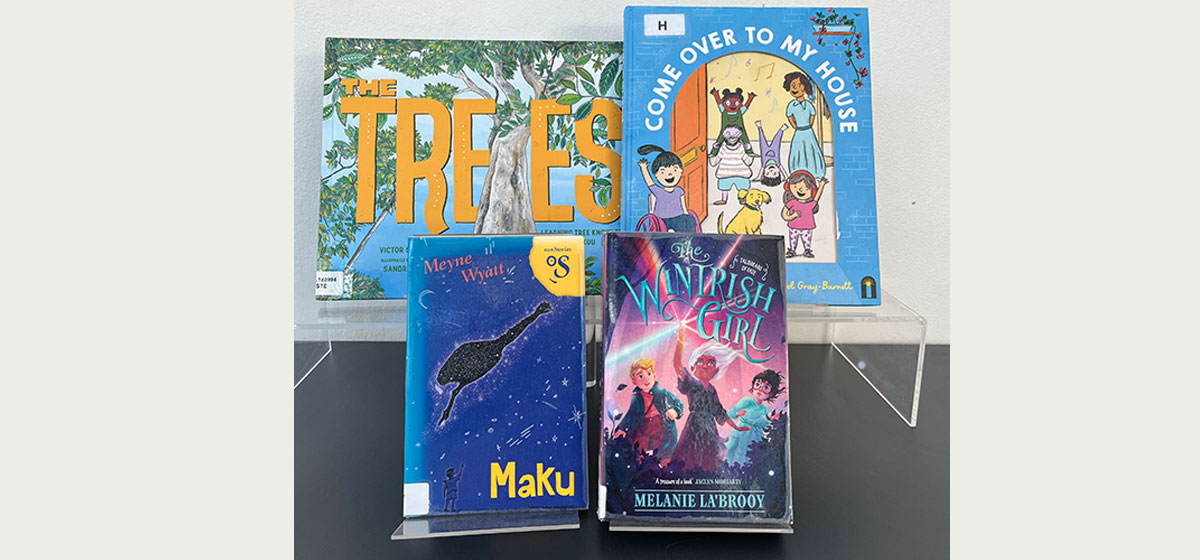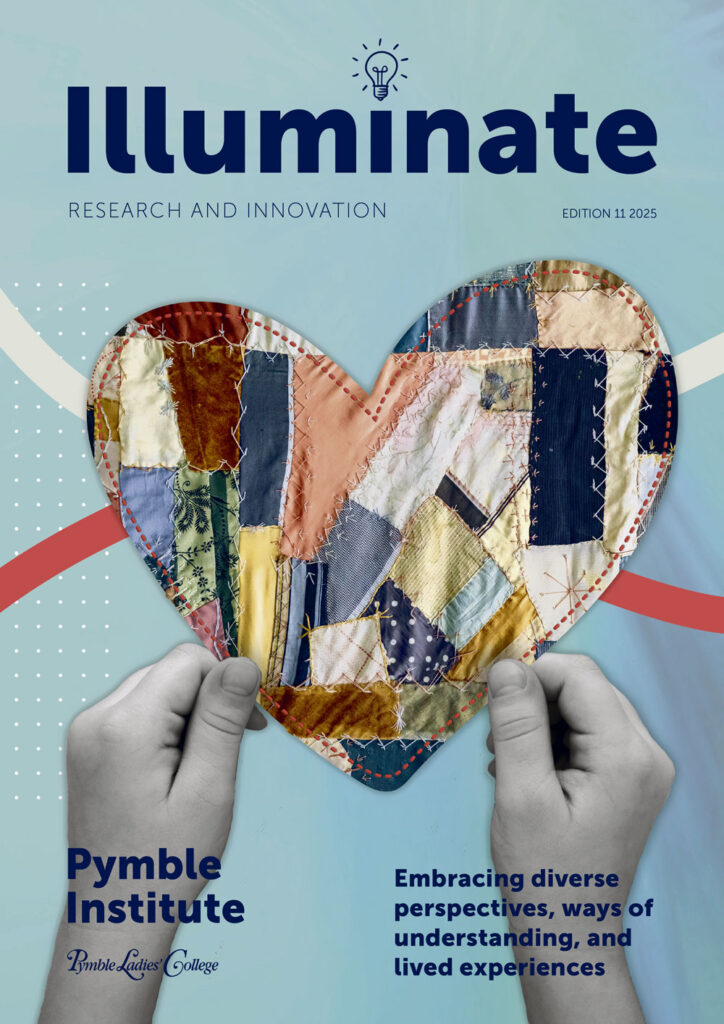The ASLA DANZ Awards – Diversity is more than just a label
July 10, 2025 |

This article was written by Martha Itzcovitz , Junior School Years 3 to 6 Teacher Librarian, Pymble Ladies’ College, and President of the Australian School Library Association
It began with a tweet….
Children’s author Kate Foster had been noticing and worrying for some time that Australia was falling behind in terms of diverse representation in children’s publishing. While vibrant awards like The Jhalak Prize, The Diverse Book Awards, The Adrien Prize, and The Little Rebel Children’s Book Awards had emerged in the UK, and The Walter Awards in the US, Australia seemed to be lacking something similar. This was especially evident when considering the country’s multicultural and diverse societal landscape.
Listening to the advocates and frustrated voices of marginalised people, not to mention her own experiences, Kate was becoming increasingly aware of the number of children being handed certain books, often approved by established and respected organisations, that did not have fair, nor balanced representation of the diversity portrayed. So many of the books with diverse characters centred only on trauma, struggles and history. As both an immigrant and an autistic person, Kate brought a unique perspective to the table. However, she questioned whether she was the right person to lead such an initiative. Creating an award requires time, expertise, and community support, and Kate was uncertain if she had enough of any of these to execute the idea properly. So, she decided to gauge the response, test the waters, and hopefully spark a conversation… and tweeted.
The then President of the Australian School Library Association (ASLA) saw that tweet and responded almost instantly – ASLA are no more knowledgeable about creating awards than Kate but as an organisation that supports and advocates for school library staff and their students, we are certainly as passionate! Very shortly after this, I stepped in as President and immediately became caught up in the enthusiasm for the project. It was important to both Kate and me that we held certain core values at the heart of this award. As people working regularly with children, we were both acutely aware of the incredible influence we have over young people and their developing brains, and so the responsibility to do this correctly and fairly was pivotal.
It was also important to us that we not only celebrate diversity, but we support the importance of giving our students authentically inclusive literature. We know there are books labelled ‘diverse’ on recommended reading lists that haven’t necessarily been written sensitively nor even accurately. There are wonderful books by authors who’ve researched in detail and written sensitively about characters and settings outside of their own personal ‘lived experience’. Yet there are many more which haven’t. This can result in books with outdated depictions of marginalised people, inaccurate and offensive stereotypes, harmful tropes, and tokenised minorities, resulting in stories told – and lives observed – from the outside looking in.
Yes, there are guidelines and resources available such as the National Centre for Australian Children’s Literature who have a cultural diversity database and the State Library of NSW who publish their assessment criterion for diverse picture books alongside their list.
We know; however, school librarians and teachers are time poor, and these guidelines are not easy to find. So, librarians, parents and teachers often turn to reviews, recommendations, and awards lists, which led to us asking the question: What if we created an easily accessible list of authentically diverse books as part of the award? Thus, the idea of curating and publishing our longlist for teachers, librarians and parents was born. This means the ASLA DANZ Awards are not just an award; they are also a widely available and quality resource. Thanks to a collaboration with BookPeople, the longlist has been published and distributed to schools, libraries, and bookstores to inform collection development and put the right book in the hands of the children who need it.
The key to the ASLA DANZ Awards is that it doesn’t just celebrate diversity in children’s literature, it celebrates authentic diversity in children’s literature. Dr Rudine Sims Bishop published the essay Mirrors, Windows and Sliding Glass Doors in 1990, noting that ‘Books are sometimes windows, offering views of worlds that may be real or imagined, familiar or strange. These windows are also sliding glass doors, and readers have only to walk through in imagination to become part of whatever world has been created or recreated by the author. When lighting conditions are just right, however, a window can also be a mirror’ (Bishop, 1990).
Reading diverse books, seeing yourself reflected in a mirror, looking through that window into another life, stepping through that sliding glass door into the story, achieves so much for a child. Young readers are positively affected by finding diversity and representations of themselves in children’s literature.
“Diversity and representation in stories, characters and illustrations in children’s literature affect how young readers see themselves, different lives and cultures, and the world around them.” (Booktrust, 2022).
It is vital for children to recognise themselves in the books they read.
As Melanie Le’Brooy (Middle Grade category winner of The Wintrish Girl) proclaimed in her acceptance speech at the 2024 ASLA DANZ Awards: Representation Matters! As an Australian woman of colour, Melanie told her young audience the story of the negative impact of never seeing herself in the books she read as a child and why this award was meaningful for her. Melanie was so passionate and emotional in her acceptance speech, and happy that diverse authors and illustrators are being recognised in this way, she was close to tears. As were we on seeing the culmination of a year of hard work, of hits and misses, and ultimately the validation of what we were trying to do. We are helping children have the chance that she never had – the chance to see themselves in the books they read.
Author and 2024-25 Australian Children’s Laureate Sally Rippin (Picture Book category winner of Come over to my Place, co-written by Eliza Hull and illustrated by Daniel Gray-Barnett) on accepting her award told of co-author Eliza Hull’s story living with a disability and not seeing herself represented in books as a child. Eliza believes there is still a stigma attached to disability and this stems from a lack of authentic representation. Research supports her belief: ‘The way disability is represented in children’s literature has the potential to affect non-disabled young readers’ views of disabled people in real life and also to reflect disabled readers’ lived experiences back to them from the page…stereotypical representations that portray disabled characters as objects of pity who have a deficit, for example, have the potential to do real harm to disabled people’ (Purkiss, 2019).
And there are so many other benefits to children and young people in reading authentically diverse books.
Confidence and resilience
We all know that diverse children’s literature promotes empathy; however, studies have also established many other benefits of authentic representation: seeing themselves in literature can improve children’s confidence which builds decision making skills and resilience; diverse literature reduces prejudice; and reading diverse books can build critical thinking skills (Blinnt, 2022).
Self Esteem
Children may not feel so isolated and alone when they see themselves in a story. As Booktrust (2022) notes, young readers are positively affected by finding diversity and representations of themselves in children’s literature.
“Diversity and representation in stories, characters and illustrations in children’s literature affect how young readers see themselves, different lives and cultures, and the world around them .“
(Booktrust, 2022)
Empathy and cultural inclusivity
Diverse literature can build a bridge between cultures and reduce prejudice.
Critical thinking skills
Reading about somebody different from themselves can spark curiosity and raise questions, which, with guidance from teachers, librarians, and carers, can help children think critically about their world and views.
Motivation and engagement in reading
Studies have shown that authentic representation can be a powerful motivator in engaging children to read, particularly in minority and lower socio-economic communities (Booktrust, 2022). Furthermore, I was fascinated to discover an Edith Cowan University study (Adam, 2022), which concludes that the three major barriers to children developing a love of reading are access, opportunity, and under-representation in books.
And so, to the awards! What did we do and how did it go?
First, how did it go? Our inaugural year was a rousing success and and we will announce the next winners in May 2025. Shortlisted creators were invited to an Awards Presentation before an audience of school children at Somerset Storyfest in Queensland where the winners were announced and handed their award. Booklists have now been printed and distributed to bookshops and bookmarks are currently in the works for schools.
And from here? We originally conceived the structure as a biennial award focusing on picture books, early chapter books and middle grade novels; however, since the first year was such a success and we received many calls for other categories, we have moved to an annual award with this year focusing on young adult, non-fiction, poetry and graphic novels.
I’d like to hand over to Kate Foster to elaborate on what we did. Kate was the organisational force of nature who coordinated these awards with such passion and energy. Her drive and hard work made the awards possible.
‘There was magic in the air the day we opened to judge applications, and with some established organisations and book clubs helping to spread the word, sign ups came thick and fast. It was important our young judges were clear on expectations from the start, but also feel comfortable and confident in reaching out to ask questions or to discuss any concerns. We also ensured each judge had not only the permission, but also the support of an adult, who would be on hand when needed to work through any challenges encountered. Though we want more than anything for our judges to enjoy this experience first and foremost, we understand that taking on such an important role and responsibility could create some stress and worry, so keeping channels of communication open and sending regular updates was essential.’
These words first appeared in ACCESS volume 37: (Foster, 2023, pp.13-15)
(Yes, our judges are children! This is one of the most important criteria we wanted to achieve – books judged for authenticity by the children who read them. However, we do have a committee made up of authors, librarians, advocates, and publishers who assess the nominations before sending them to the judges.)
Back to Kate:
‘There was no hesitation to employ highly skilled sensitivity readers and editors to assess our communication and correspondence, from the website to the entry criteria to the application forms. There is always room for improvement in this space, so doing everything possible to listen, learn, and to action suggested changes to make more people welcome and feel safe when it comes to the DANZ brand was key from the outset. That doesn’t mean we’ll ever rest on our laurels, particularly when language and society are constantly evolving. We’ll always invite feedback and be open to discussion to do better, and most importantly not shy away from any mistakes we may make.
‘Many decisions were straightforward, but we did have several meetings and discussions about those nominations which divided opinion. We said upfront that we’d be thorough and critical in our assessment, but also fair, and that’s exactly what we’ve been. The process did take a little more time than we originally scheduled, but this was not something we were ever going to rush. Members of the panel each came from different walks of life, so inviting each other to safely express our thoughts was vital and at the heart of what DANZ stands for.
‘Despite all the positivity, excitement, and not to mention the stunning range of books we did receive, we’ve uncovered one concern in particular: The glaring lack of chapter books or early readers, aimed at readers aged 5 to 8, that feature diverse characters. Though of course aware that not every diverse book published in Australia and New Zealand was nominated for the award, we received few. It’s highlighted what we consider a rather large and worrying percentage of children who are still not seeing themselves represented in the books they’re currently reading.
‘As a result of our findings, we hope publishers will sit up and pay attention and start filling this gap with a strong selection of rich and exciting early readers featuring diverse characters and storylines, and that are preferably written and created by diverse artists.’ (Foster, 2023, pp.13-15)
These words first appeared in ACCESS volume 37: (Foster, 2023, pp.13-15)
ASLA DANZ 2024 Winners
Picture Book: Come Over to my House, written by Sally Rippin and Eliza Hull and iluustrated by Daniel Gray-Barnett
Chapter Book: Maku by Meyne Wyatt
Middle Grade: The Wintrish Girl by Melanie La’Brooy
ASLA DANZ 2025 Winners
Young Adult: Catch a Falling Star by Eileen Merriman
Graphic Novel: Ghost Book by Remi Lai
Non-Fiction: Trees by Victor Steffensen and Sandra Steffensen
Poetry: Pasifika Navigators by 52 Pasifika Student Authors
For the full longlist and more information visit the ASLA DANZ website: thedanzchildrensbookaward.com


